-
|
16 September 2022
|Posteado en : Opinion
Police officers can develop mental and physical health problems due to the traumas they face during their career. Understanding and learning how to manage stress helps to prevent, recognise or avoid misbehaviour that undermines public trust in law enforcement. How do we address mental health in law enforcement?
Valentina Salvato, project officer of the project Promoting community policing in Lebanon, co-led by the FIIAPP, reflects on the importance of paying attention to mental health in police forces and the action developed by the project through various training courses for this purpose.
Why is this approach necessary?
Being a police officer means being exposed on a daily basis to traumatic events that can endanger their own life: accidents, violence, critical situations and emergencies, natural disasters… All of these entail risks that can affect the mental health of any person. Moreover, we must take into account the current context of Lebanon, a country affected by an unprecedented severe political, economic and financial crisis and a series of traumatic events – the demonstrations of October 2019, the Beirut port explosion in August 2020 and the consequent worsening of the Covid-19 pandemic – which have had a direct impact on the lives of citizens, their behaviour, their psychological stability and their mental health.
How do we address mental health within the security forces?
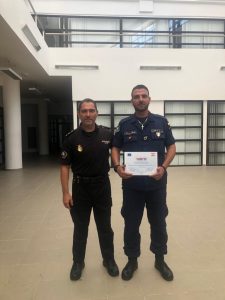
The Chief Inspector of the Spanish National Police and director of the project, Joaquín Plasencia García (left), with one of the Lebanese officers who participated in the training in Aramoun. From the project Support to community policing in Lebanon, we seek to shed light on the issue of mental health in the security forces: a problem that is often ignored, unknown or even rejected. However, the truth is that police officers can develop mental and physical health problems due to the traumas they face during their career. Understanding and learning to manage stress helps to prevent, recognise or avoid misbehaviour that undermines public confidence in law enforcement. As the chief inspector of the Spanish National Police and director of the project, Joaquín Plasencia García, points out, “if a police officer loses the trust of citizens, he loses everything”.
For this reason, we support the Lebanese police in order to implement a preventive and psycho-educational strategy with psychological tools and methodologies to prevent, protect and resolve possible stress situations.
Thanks to the trainings we have offered in Lebanon, such as the last one at the Internal Security Forces Academy (Aramoun), 63 police officers have received tools to prevent and deal with stress situations, conflict resolution, anxiety and post-traumatic stress disorder, depression, anger management or emotion control. This mental health training is also an excellent form of primary prevention, as it increases the knowledge, awareness and resilience of all officers, achieving a direct impact on citizen care, as it reduces and prevents episodes of misconduct in the security forces.
By caring for the well-being of those who care for us, citizens receive better care and service.
-
|
05 September 2022
|Posteado en : Inf first person
Two delegations of foreign ministry and migration officials from Colombia and Ecuador arrive in Spain, on a study visit organised by the EUROFRONT programme, to learn about the border control model implemented in the Schengen area
Gema Palencia, a EUROFRONT technician, recounts the visit, which takes place between Madrid, Algeciras and Tarifa, in the form of a diary. A journey under the certainty that the only way to tackle transnational crime is through cooperation.
DAY I. 5 September 2022
There will be five days of visits to police institutions for migration management and cooperation, as well as border posts at airports and ports.
An interesting opportunity offered by the European Union programme co-led by the FIIAPP, EUROFRONT, to exchange processes and procedures, learn efficient interventions on both sides and find opportunities for collaboration that can be applied to Colombia and Ecuador and the other countries with which the programme collaborates: Argentina, Brazil, Bolivia, Peru and Paraguay.
With enthusiasm and the hope that from the meeting we will find greater opportunities for collaboration… Let’s get started!
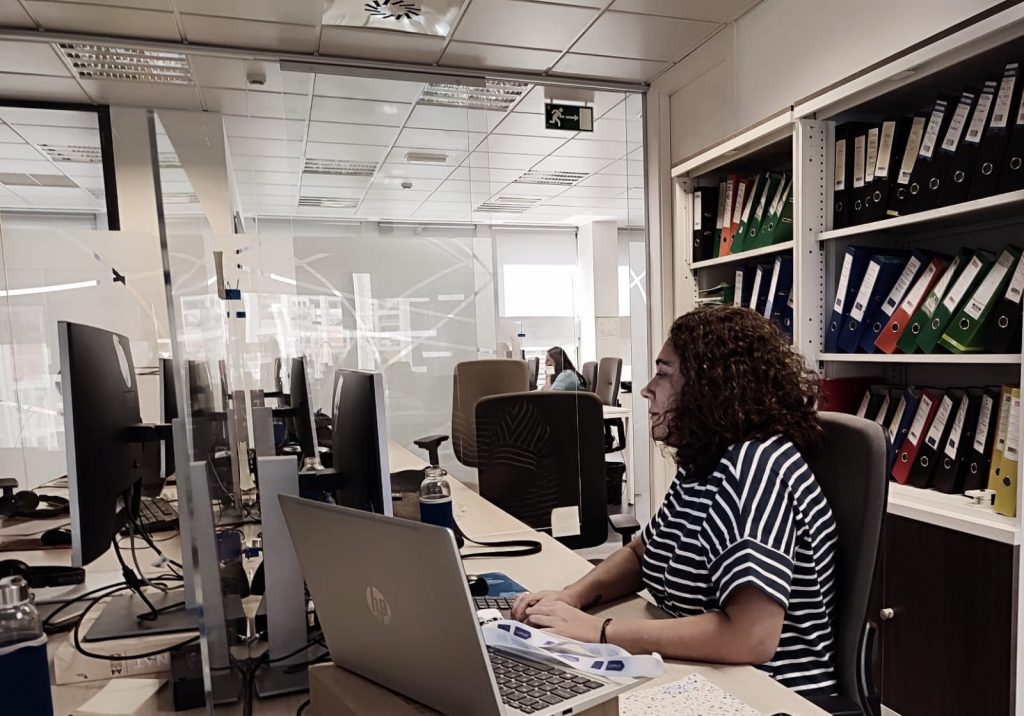
Gema Palencia, EUROFRONT technician, works in the FIIAPP office in Madrid organising the visit to Spain of delegations of foreign ministry and migration officials from Colombia and Ecuador. At the General Commissariat for Foreigners and Borders I meet the members of the delegations in person, and after numerous e-mail correspondence it is pleasant to put a face and a voice to the participants.
Despite the jet lag, they were particularly participative during the presentation by Commissioner General Julián Ávila Polo and in the subsequent presentations on the different units that make up the General Commissariat.
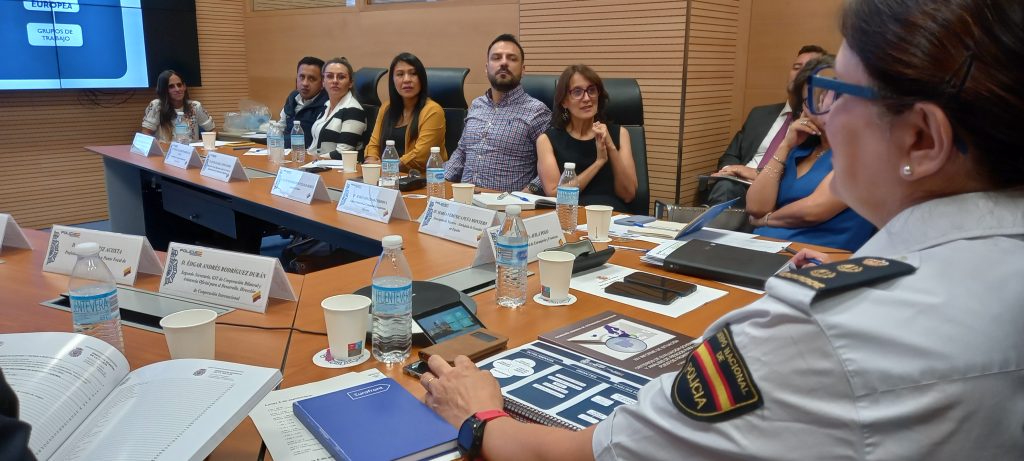
Delegations of chancellery and migration officials from Colombia and Ecuador during their visit to the Comisaría General de Extranjería y Fronteras in Madrid. Among the comments, the issue of the Venezuelan problem, common to all countries, and the exchange of information, came up for discussion. Another topic of interest is the successful experience of Punto Atenas, an operational document verification service run by experts in document forgery, which in ten months has dealt with 3,400 queries from various authorities. The idea of replicating a similar system in the Latin American region is met with great interest.
The afternoon is devoted to Barajas Airport and to getting to know in situ the operational border management in the Schengen area.
Full day 1, intense and with many open questions. We continue…
DAY II. 6 September 2022
On the way to the International Cooperation Division of the police, comments revolved around the previous day’s visit to Barajas Airport. The means of detecting forged documents or automated passages captured the most interest of the tour.
Information exchange and cooperation were the key words of Tuesday’s session. Based on the conviction that this is the only way to tackle transnational crime, the functions and effective results of the SIRENE Office, an exchange point with European police forces, as well as those of the INTERPOL and EUROPOL offices, were presented.
I continue to be surprised by the high level of interest of the delegations, and not only me, but also the rapporteurs, who are grateful to have such active participants. During his presentation, the Head of the Operational Section of the SIRENE bureau, Agustín Hernández, points out:
“A large part of today’s organised crime is transnational, therefore international police cooperation is essential to tackle it”
And among the debate arises the need to share data to combat new forms of irregular migration, and as an example, the citizens of Central Asian countries who use South American airports as a gateway to reach the United States.
The Division is also the key point of collaboration with Spanish Cooperation institutions, as it participates in the management of around 30 international projects, several of them implemented by the FIIAPP.
In the afternoon, train to Algeciras to learn about Operation Minerva and border management in the port area.
On the road…
DAY III. 7 September 2022
In the Bay of Algeciras, a sea and an ocean meet, two continents come together and cultures cross. A key point of entry to Europe from Morocco, between June and September it can see up to 2.5 million people pass through.
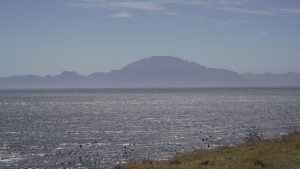
Moroccan coast as seen from Algeciras The delegations from Ecuador and Colombia have learned in situ how police teams with members of up to 17 nationalities are integrated to support the control of trafficking in persons and goods within the framework of Operation Minerva of the European Border and Coast Guard Agency (Frontex) and led by the Spanish National Police during the summer months.
This coordinated action streamlines management thanks to the specific knowledge of each country’s agents and the ease of access to their countries’ databases, which allows for rapid verification of travel documents.
An example of cooperation that has shown them the possibility of extending the current bilateral agreements that each country has with its neighbours to a regional level. The Undersecretary of the Ecuadorian Migrant Community, María Soledad Córdova, stressed that:
“The European Union is a strategic ally in border management and in addressing the challenges of migration”
They are struck by the magnitude of the movement of passengers, vehicles and goods and the effective organisational machinery in Tarifa and Algeciras, as well as the detection of irregularities and the effective cooperation that serves to alert or prevent crimes in other European countries.
It is also surprising how close Africa can be seen from the bay, much closer than it appears on the maps.
From the comments among the group and with the agents at the border, I perceive that the reflections after what we have heard and witnessed these days are taking more and more shape.
Day IV. 8 September 2022
After visiting the headquarters of the Central Unit for Illegal Immigration Networks and Documentary Forgery (UCRIF) in Madrid, we see the work on the ground in the Algeciras office.
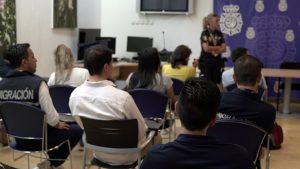
Border experts from Colombia and Ecuador during the explanations given by National Police officers at the Algeciras police station Issues detected at border controls are in many cases the thread that is pulled to unmask human or capital trafficking networks, or the clues that are shared with other international police forces, the missing piece of the puzzle to stop gangs that operate globally.
The second secretary of the Colombian Foreign Ministry’s International Cooperation Directorate, Andrés Rodríguez, points out during the visit:
“Migration challenges at the border must be addressed jointly and EUROFRONT is a programme that can provide important lessons for Colombia”
Questions about deadlines and procedures for irregular cases or the comparison of different legislations are the main part of the debate during the last day of the visit to Algeciras, in which delegations finalise all aspects related to cross-border crimes, from detection and control to investigation.
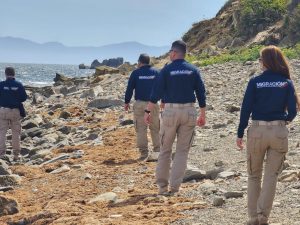
Members of the Colombian delegation observe the Moroccan coast from Algeciras And back on the train to Madrid… time for reflection. Friday’s day of conclusions looks set to be interesting.
Tomorrow we continue…
Day V. 9 September 2022
Last day….
We closed by learning about the ADEXTTRA database containing information and registration of foreigners. A swarm of interconnected databases, from various sources, which allows the cross-referencing and extraction of information of great use both for the police and for various public institutions that manage the issuance of documents and various procedures with foreigners.
The final assessment puts on the table new paths to follow in terms of training, bilateral and regional cooperation following the European model of the Athens Point, legislative harmonisation and formal follow-up, when the delegations return to their countries and the proposals to be followed are institutionally validated.
If there is one thing they all agree on, it is the positive thing of having seen that it is possible, and the high effectiveness of police and institutional cooperation, which is essential to combat cross-border crime.
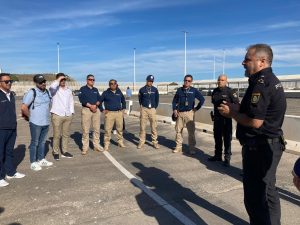
Delegaciones de Colombia y Ecuador escuchan las explicaciones durante su visita al Puerto de Tarifa The FIIAPP and EUROFRONT have also received some interesting learning. Víctor Suárez and Agustín Hernández, experts in foreigners from EUROFRONT who organised the technical visit and accompanied the delegations, emphasise how productive the exchange was and how productive it was to learn about other forms of management. They have now also noted down some highly recommendable ideas to incorporate into the processes in Spain.
The visit is over, but we are continuing with a closer and more effective collaboration, adapted to the needs of each country.
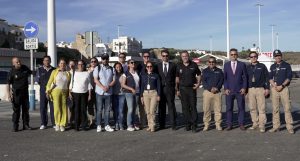
The delegations of Ecuador and Colombia pose with several agents of the National Police in the Port of Tarifa during their visit We go on…. And we are doing much better.
-
|
16 May 2019
|Posteado en : Interview
Rafael Ríos, coordinator of A-TIPSOM: the fight against people trafficking and irregular migration in Nigeria, explains how he has been adapting to the country, what his daily routine is like, and what it is like to work as a FIIAPP expatriate.
How long have you been in Nigeria? How have you adapted to this country?
I arrived on 16 July 2018. When you arrive in a new country, as you can imagine, it is not always easy. I remember hearing about other projects, from other colleagues who had been in or were in other countries, who said “the beginning is always the hardest”. For me this has been a bit simpler, or less complicated, and I’ll tell you why. In this country we already had the embassy staff, and they helped us with everything from the outset, arriving in the country, accreditations, looking for accommodation, the office, etc. We spent almost four months in a small office that they kindly lent us until we were able to move. I wish you could count on this kind of support every time you started a project.
What has been the most difficult aspect to adapt to, and the easiest?
The hardest part was perhaps the second week. During the first week everything is frenetic, you have so many things on your plate… But the second week was like coming back down to Earth. That’s when I really started to realize where I was, and the step that I’d taken. Such a long project with so many important challenges. The easiest thing was perhaps meeting people, dealing with the Nigerians, who I think are happy people who enjoy their country and who, in general, welcome newcomers quite readily.
Is this your first experience outside of Spain?
No, it’s not. Belonging to the National Police gives you opportunities like this, discovering other countries and destinations, doing what you enjoy and what you know best. Previously I’d done different jobs in African countries, on short-term missions in Mauritania, Guinea Bissau, Senegal, as well as in Europe, in Italy to be precise.
In light of this, is this proving to be very different to your previous missions?
The concept behind this mission is quite different. This one is long-term and involves a permanent deployment in another country plus working as an expert for FIIAPP . It’s something else entirely, and it’s a big professional challenge for me, since what we are trying to achieve with this project is very alluring, and at the same time very ambitious .
What is your work like, your daily routine?
Honestly, I think it’s not that different. Here, because of the hot weather, you get up and start work quite early. We get to the office, have meetings, go out to the different places we need to visit as part of the project. Usually we have lunch at the office and return home in mid-afternoon.
Is it very different from the routine you had in Spain?
As I said, it is a job that requires a lot of contact with one’s counterparts,which means you are often out of the office, and I find that quite interesting.
What is your relationship like with the FIIAPP team in Madrid?
Great! I would say that, in addition to having a great professional relationship, we talk every day, we share ideas, etc. We have even created bonds that are enabling us to achieve better results in the project, of that I am sure.
And with your colleagues in Nigeria?
The same. Several months on, the team in the field has been growing, with Nigerian personnel, which helps us a lot to understand their way of working, what they’re like, their customs.
How would you assess your experience of working as a FIIAPP expatriate?
It is very positive so far. I think it is helping me to understand how an institution like FIIAPP copes with so many projects and with the scope of the work it does. The training, its structure and its values are enabling me to acquire knowledge. When you belong to an institution like the National Police, sometimes you focus so much on your professional life that you do not realize how work is done elsewhere, so the project is helping to train me both professionally and personally .
Do you have any experiences or anecdotes about your arrival in or adaptation to the country?
Well, I could tell you several, but I’ll just say that I like saying good morning and learning new words in a dialect called Hausa, and in the building where we work I usually see two young people who like to teach me words like that: good morning, let’s go, go ahead… and it makes them laugh when they hear me pronounce them… Inakwana, which means good morning, is part of the day-to-day.
-
|
09 September 2016
|Posteado en : Interview
El día 8 de septiembre, se celebra el Día del Cooperante. The 8th of September is the International Volunteers Day. Thousands of professionals, through their work, are fighting against poverty, for sustainable development and a fairer world. Nearly three thousand of them, according to the Spanish Agency for International Development Cooperation (AECID), are Spaniards. One of them is Santiago García-Noblejas, Chief Inspector of the National Police. He has worked on international cooperation projects with the International and Ibero-American Foundation for Administration and Public Policies (FIIAPP) since 2002 and, as he himself recognises, has been interested in the international sector for nearly his entire life. In this interview, he tells us about his experiences with FIIAPP and his experiences in the world of international cooperation.
How many countries have you visited whilst working on FIIAPP projects?
With FIIAPP projects, just three. I have implemented projects as a coordinator. At first, I was called a PAA, which means Pre-Accession Adviser, and later I was called an RTA, Resident Twinning Adviser. The two titles refer to the coordinator of Twinning projects in the field.
In which countries?
I started in Slovenia, from December 2002 to December 2003, with a very short but very nice project that turned out quite successfully. In fact, the results have lasted over time, as the bilateral relations with the country have continued. We could talk of the sustainability we hear so much about now.
Later, from June 2004 to June 2005, I was in Lithuania with another short but very nice project.
And lastly I was in Bulgaria, where the project had a larger scope, with a duration of two years, from June 2006 to June 2008.
What were the objectives of each of your projects?
In Slovenia and Lithuania, the projects were focused on the creation of international cooperation structures within the European Union, therefore within these two countries we worked on creating the future SIRENE (Supplementary Information Request and National Entry) office, which is a type of cooperation office that exists in each of the Schengen countries. The office works to streamline urgent police cooperation that is established in the Schengen space. Above all, we worked on the creation of the European Police (EUROPOL) office in Slovenia.
In addition, the project helped, first, to make sure that the country complied with the European standards required at that time and, second, to provide training to the police officials who were going to be assigned to the EUROPOL national offices cooperating with the rest of the countries.
In Bulgaria the project was much more technical, because it was really a matter of training the Bulgarian officials on the Schengen border control procedures. At the same time, the project helped with computerisation of the system that had been in use in the country up until then for screening people, the Schengen Information System (SIS).
How did you get interested in this type of project and in institutional cooperation?
The truth is that there is no one single motivation. In my particular case, I have had an international inclination since I was very young. I was a bit frustrated because my parents couldn’t afford trips abroad. When I was 15, 16 or 18, there was no Erasmus programme; there weren’t the possibilities that exist today.
I’ve always had that itch, and I’ve always wanted to get out there, go beyond.
And I achieved it thanks to my talent for languages and international public relations, and the fact that my family gave me its support and has always been willing to follow me on these adventures. I knew that by leaving my normal professional circle, I was going to enjoy a prestige that, at that time, wasn’t easy to attain…
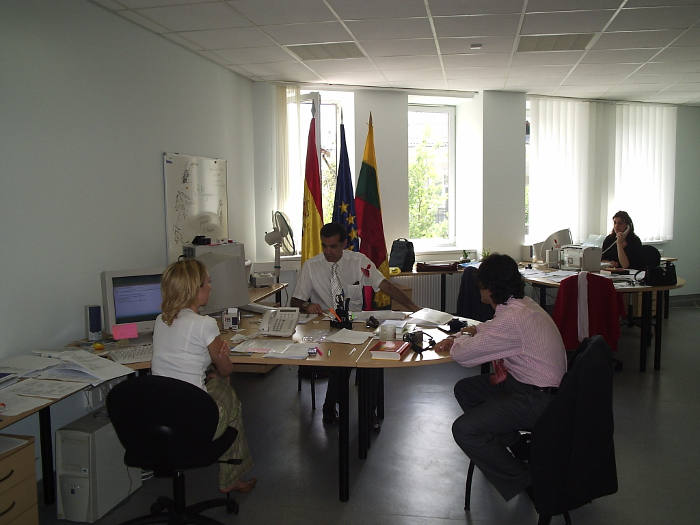
Santiago García-Noblejas with his work team in Lithuania How did your relationship with FIIAPP projects start?
It was a bit of a coincidence. They had proposed that I work on another European Union project in a Caribbean country that later didn’t pan out. So, at that moment, the Directorate-General of the Police was starting to work on Twinning projects, and FIIAPP was there managing the budget and providing logistical support to the work of the experts participating in these projects. Since I wasn’t going to the Caribbean project, they offered me the one in Slovenia. I found it very exciting and I don’t think it took me even five seconds to say that my bags were packed and I was on board. Even in the first meeting that we had, FIIAPP was present.
At that time, I didn’t know about FIIAPP; I knew Eva Suárez, who was the officer managing the project in Slovenia. She helped me tremendously because she was a great organizer and, for me, the face and the soul of the Foundation. Thanks to Eva, I became much closer to FIIAPP, the project with Slovenia turned out very well, I met tons of people at FIIAPP, and since then have had professional and personal relationships with many other workers.
What would you like to highlight about all these experiences in international cooperation projects?
I can’t put it into words, believe me. Personally, it has meant becoming a person with abilities, ideas and a level of development that I feel completely satisfied with. I credit a big part of my personality and my current happiness to having worked in the international cooperation.
Because it’s given me the opportunity to learn about countries, cultures, people—some good, some bad, others fair—to summarise… cooperation has made me grow as a person.
What is clear is that I have a different perspective on problems and situations, to a great extent, I think, thanks to having been exposed to the influence of other cultural norms and ways of working. It’s very difficult to explain it. It would take a book to explain all of this.
What is your assessment of international cooperation?
The assessment is great; the thing is that it’s like a vast sea, where a small contribution from an individual can seem insignificant or of little value when taken on its own.
However, these types of international cooperation relationships, what they do is open up many roads and facilitate many tasks that come later.
And I’m going to give you an example: whilst I was at my last destination as an attaché of the Ministry of the Interior at the Spanish embassy in Romania, the European basketball championship was held in Slovenia; so I proposed to the Slovenian Minister of the Interior the idea of assisting the Spanish citizens, and those of other countries participating in the championship, who were going to come to see the matches. The idea was to establish a cooperation mechanism in which police from Spain and other countries would work with the Slovenian police to provide direct support to the security needs of the citizens arriving as tourists to watch the matches. We implemented it, and it was phenomenal to the point that the idea was used again at the European football finals in Bucharest and at the world basketball championship in France. For me, that’s an example of international cooperation. The citizens got an additional public service, paid for, moreover, by their taxes, outside of their country.
Now you’re working on getting involved in a new FIIAPP-managed project in Myanmar. Where are you with that?
Well, we’re working and negotiating. We’re going to have meetings with the beneficiaries, the Myanmar police, and with the European Union delegation to coordinate and clarify some issues that still aren’t nailed down.
My hope and dream is to be able to start the project there and for people in Myanmar to learn about the Spanish.
In this case, the project is very broad. Following the philosophy of the new democratic government now in power in the country, we are going to participate and assist in the comprehensive process of reforming the country’s administration. In our case, we’re going to collaborate in the process of reforming the country’s police, by orienting it towards offering a public service. Because up until now, the police were directly linked to the army; it was a police force very focused on protecting the state but not on protecting citizens. It’s a question of establishing a series of democratic controls over the police and giving them training that is more oriented towards respect for human rights.




